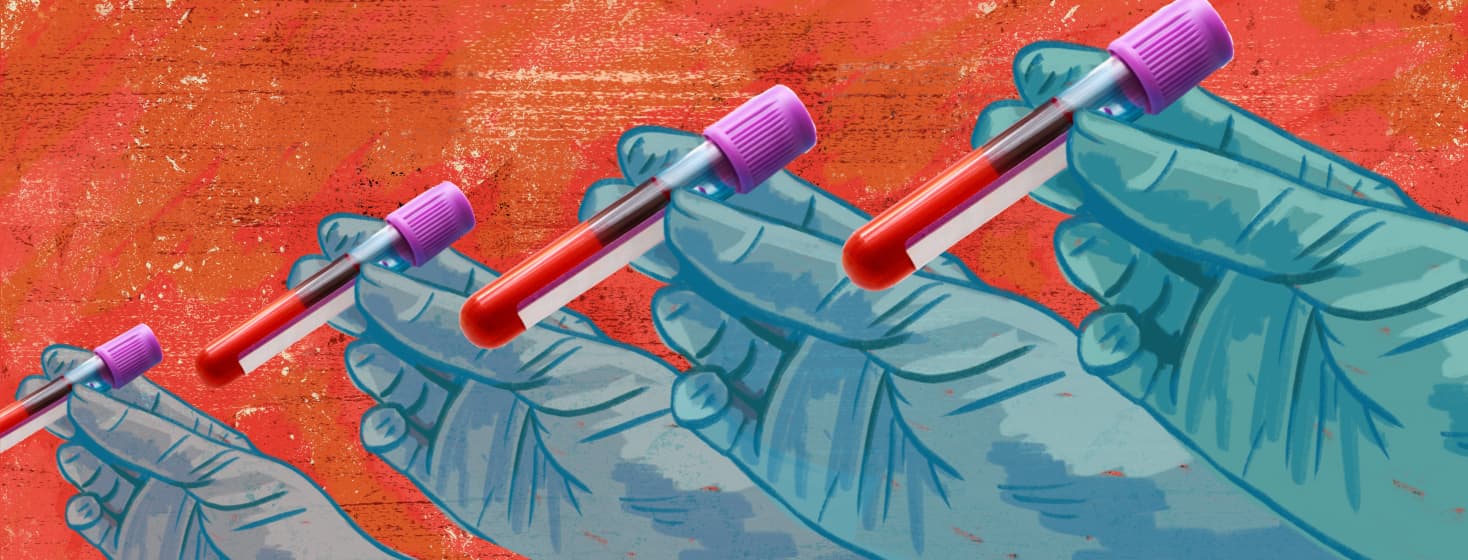Diagnosis of Hepatitis C
Reviewed by: HU Medical Review Board | Last reviewed: February 2022 | Last updated: May 2022
Diagnosing the hepatitis C virus (HCV) can be challenging. Some people may have symptoms when they are first exposed. However, most will not have any signs of HCV until liver damage has occurred. This can be years or decades after a person gets HCV.1
Screening for HCV
Screening is important in diagnosing HCV. Screening refers to testing for a health condition before symptoms occur. Some conditions like HCV have a period of time where they can be detected and treated before a person knows they have them. Other conditions that can be screened for include breast cancer (mammograms) and colon cancer (colonoscopies).2
In the United States, it is recommended that all adults over age 18 get screened for HCV at least once, regardless of their risk. This is different from previous advice. In the past, only specific groups at higher risk were tested. These groups include:1,3,4
- Baby boomers (born between 1945 and 1965)
- who inject drugs
- People with HIV
- People on regular hemodialysis for kidney disease
People who are regularly at high risk for getting HCV may benefit from testing every year. These include:1
- People on ongoing hemodialysis
- People who inject drugs
- Men who have sex with men and who:
- Have HIV
- Are on pre-exposure prophylaxis drugs to prevent HIV
- Anyone who regularly has sex with someone who has HCV
In addition, pregnant women are often screened for HCV. Children under 18 who are at risk for HCV can also be screened.1
Viral load testing
The screening test is usually an antibody test. Antibodies are proteins the body makes to fight germs. When the body is exposed to an invader, it makes antibodies to target the invader. If a person tests positive for the HCV antibody, they have likely been exposed to the virus.1
But just because a person tests positive for the antibody does not mean they currently have HCV. They may have had HCV in the past and received treatment. Their body may have cleared the virus on its own, which happens to an estimated 20 to 45 percent of people infected with HCV. In order to determine if a person has active HCV, a viral load test is needed.1,4
A viral load test measures how much of the virus’s genetic material is in the blood. A person will have genetic material from HCV in their blood if the virus is actively copying itself. Viral loads can be used to diagnose active HCV and monitor response to treatment.1
History and physical exam
Like with any health issue, part of getting a diagnosis is having a complete medical history taken and a physical exam performed. Your doctor will ask about:
- Symptoms you have been having
- Possible HCV exposures you had in the past
- Drugs or supplements you take
- Any other medical conditions you have
They will also do a full physical exam. This includes trying to feel your liver to see if it is enlarged or hardened with scar tissue. Doctors typically do this by having you lie flat on your back and pushing underneath the right side of your ribcage.
Lab testing
Other lab tests might be helpful in diagnosing HCV. Lab tests assess whether HCV has impacted the liver and, if so, how much. They also look for other health issues. Some tests are helpful in picking future treatment options.
Common lab tests include:3,4
- Liver function tests
- Blood clotting tests
- A complete blood count (red and white blood cell numbers)
- Kidney function tests
- A pregnancy tests
Your doctor may also test you for other conditions that commonly co-occur with HCV. These include HIV and other forms of hepatitis (like hepatitis A or B).3,4
Assessing liver damage
Since HCV infects the liver, your doctor will look for signs of damage. The liver can be viewed through non-invasive or invasive methods. Non-invasive methods include imaging like ultrasound (FibroScan) or magnetic resonance elastography (MRE). Some blood tests can also be used to assess the damage.1,4
However, sometimes non-invasive methods are not enough to assess the damage. If more invasive methods are needed, a liver biopsy may be completed. During a liver biopsy, a part of the liver is collected through a small needle. Since it is a medical procedure with risks, it is considered more invasive.4
Your doctor will combine the results of all aspects of diagnosis to determine whether or not you have HCV and if liver damage has occurred. They can also determine the best next steps or treatment options.

Join the conversation